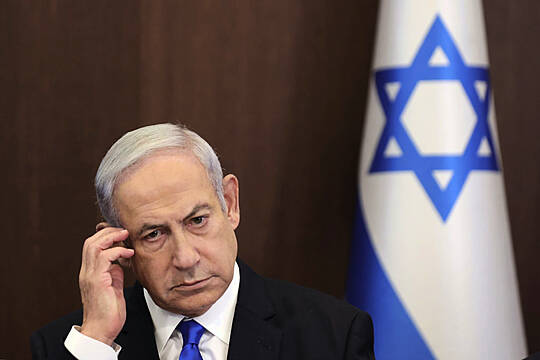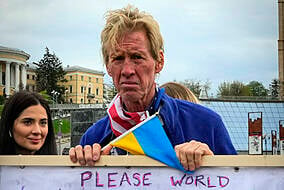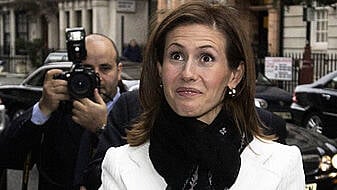Israeli prime minister Benjamin Netanyahu was recovering in hospital after an emergency heart procedure while opposition to his government’s contentious judicial overhaul plan reached a fever pitch and unrest gripped the country.
Mr Netanyahu’s doctors said the heart pacemaker implantation went smoothly and that Mr Netanyahu, 73, felt fine.
According to his office, he was expected to be discharged later on Sunday.
But tensions were surging as politicians began a marathon debate over the first major piece of the overhaul, ahead of a vote in parliament enshrining it into law on Monday.
Mass protests were set to continue.
Hundreds of thousands of people took to the streets across Israel on Saturday night, while thousands marched into Jerusalem and camped out near the Knesset, or parliament, ahead of Monday’s vote.

Mr Netanyahu’s sudden hospital admission added another dizzying twist to an already dramatic series of events that are certain to shape Israel’s future.
It comes as the longest-serving Israeli leader faces the gravest challenge of his leadership and the country’s worst domestic crisis which has shaken the economy, forged cracks in the country’s military and tested the delicate social fabric that holds the polarized country together.
Politicians began their debate despite the hospital admission.
In a fiery speech launching the session, Simcha Rothman, a main driver of the overhaul, denounced the courts, saying they damaged Israel’s democratic fundamentals by arbitrarily striking down government decisions.
“This small clause is meant to restore democracy to the state of Israel,” Mr Rothman said.
“I call on Knesset members to approve the bill.”
Still Mr Netanyahu’s health woes disrupted his routine.
The weekly Cabinet meeting scheduled for Sunday morning was postponed and Israeli Army Radio reported that a security assessment of the effect of the legal dispute on the military was also taken off Mr Netanyahu’s schedule.
Mr Netanyahu’s office said that he was sedated during the implantation and that a top deputy, Justice Minister Yariv Levin, stood in for him while he underwent the procedure.
Mr Levin, a close confidant of the prime minister, is the mastermind of the overhaul.
In a video from his hospital room on Sunday afternoon, Mr Netanyahu, wearing a white dress shirt and dark blazer, said he felt fine. He said he was pushing forward with the legislation but also pursuing a compromise with his opponents.
“In any case, I want you to know that tomorrow morning I’m joining my friends at the Knesset,” he said, without saying when he would be released.
Israeli media said last-ditch efforts were under way to find a solution out of the impasse. But it was not clear whether those would bear fruit.
Legislators are set to vote on an overhaul measure that would limit the Supreme Court’s oversight powers by preventing judges from striking down government decisions on the basis that they are “unreasonable”.
Monday’s vote would mark the first major piece of legislation to be approved.

Proponents say the current “reasonability” standard gives judges excessive powers over decision-making by elected officials. Critics say removing the standard, which is invoked infrequently, would allow the government to pass arbitrary decisions, make improper appointments or firings and open the door to corruption.
The overhaul also calls for other sweeping changes aimed at curbing the powers of the judiciary, from limiting the Supreme Court’s ability to challenge parliamentary decisions, to changing the way judges are selected.
Speaking in parliament, opposition leader Yair Lapid called for Netanyahu to resume compromise talks and lauded the protesters for standing up to the government.
“The government of Israel launched a war of attrition against the citizens of Israel and discovered the people can’t be broken. We won’t give up on our children’s future,” he said.
Protesters, who come from a wide swathe of Israeli society, see the overhaul as a power grab fuelled by personal and political grievances of Mr Netanyahu, who is on trial for corruption charges, and his partners who want to deepen Israel’s control of the occupied West Bank and perpetuate controversial draft exemptions for ultra-Orthodox men.
Mr Netanyahu was rushed to hospital in the middle of the night a week after being taken to hospital for what doctors said was dehydration.
They released him then after implanting a device to monitor his heart but he was taken to hospital again because it showed anomalies, prompting the need for a pacemaker.
Professor Roy Beinart, senior physician and director at the Davidai Arrhythmia Centre at Sheba Medical Centre’s Heart Institute, said doctors had decided to monitor Mr Netanyahu because he had suffered from a “conduction disorder”, or irregular heart beat, for years.
He said in a video that the prime minister needed the pacemaker because he experienced “a temporary arrhythmia”, or irregular heartbeat, on Saturday evening.
“The implantation went smoothly, without any complications.
“He is not in a life-threatening condition,” Prof Beinart said.
“He feels great and is returning to his daily routine.”
Further ratcheting up the pressure on the Israeli leader, military reservists in fast-rising numbers have been declaring their refusal to serve under a government taking steps that they see as setting the country on a path to dictatorship.
Those moves have prompted fears that the military’s preparedness could be compromised.







